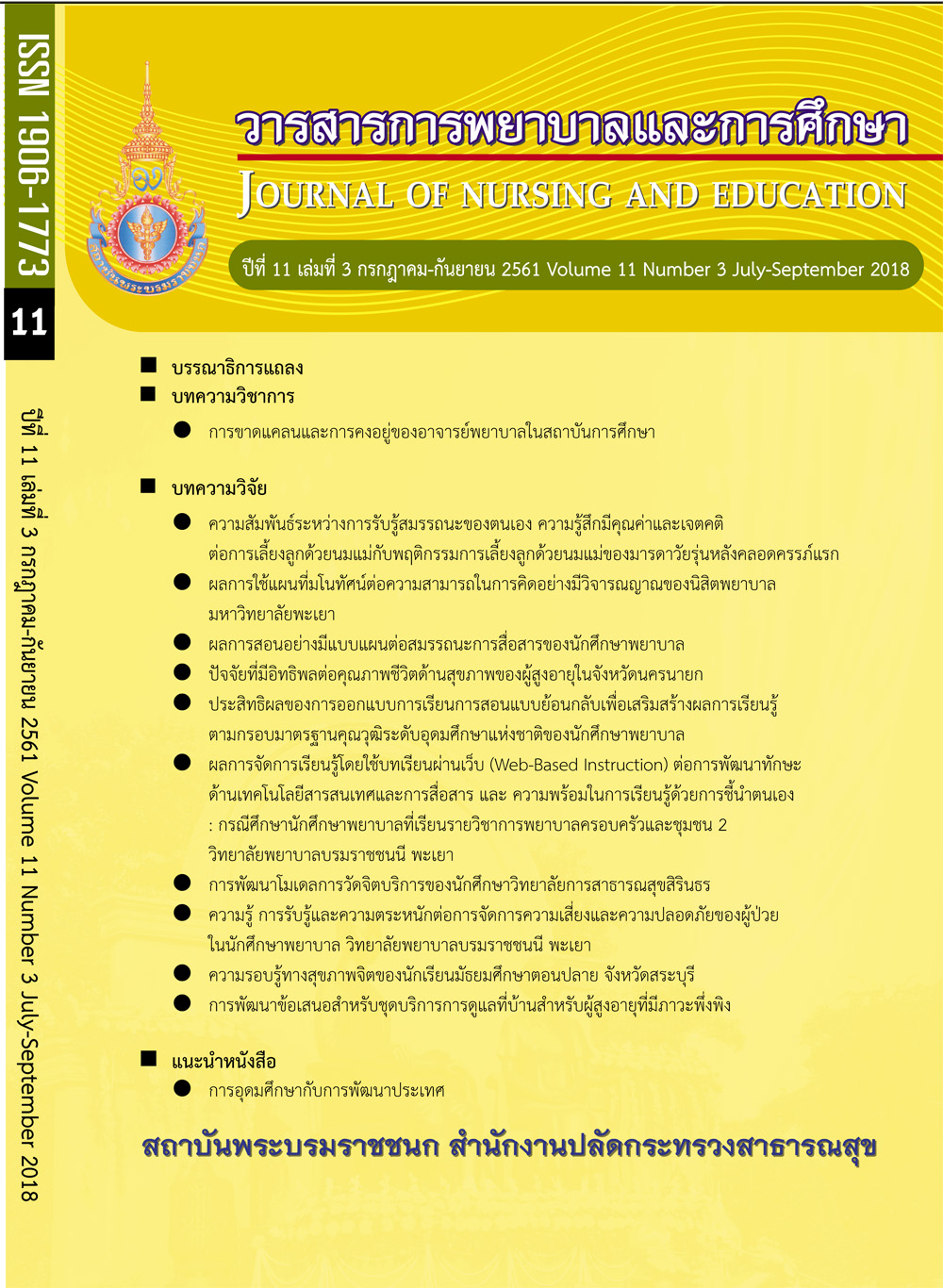ความสัมพันธ์ระหว่างการรับรู้สมรรถนะของตนเอง ความรู้สึกมีคุณค่า และเจตคติต่อการเลี้ยงลูกด้วยนมแม่กับพฤติกรรมการเลี้ยงลูก ด้วยนมแม่ของมารดาวัยรุ่นหลังคลอดครรภ์แรก
The Relationship between Self-efficacy, Self-esteem, Attitude Toward Breastfeeding and Breastfeeding Behaviors in the First-time Teenage Postpartum Mothers
คำสำคัญ:
การรับรู้สมรรถนะของตนเอง, ความรู้สึกมีคุณค่า, เจตคติต่อการเลี้ยงลูกด้วยนมแม่, พฤติกรรมการเลี้ยงลูกด้วยนมแม่, มารดาวัยรุ่นหลังคลอดบทคัดย่อ
บทคัดย่อ
การวิจัยเชิงพรรณนาแบบวิเคราะห์ความสัมพันธ์นี้ เพื่อศึกษาความสัมพันธ์ระหว่างการรับรู้สมรรถนะ
ของตนเอง ความรู้สึกมีคุณค่าและเจตคติต่อการเลี้ยงลูกด้วยนมแม่กับพฤติกรรมการเลี้ยงลูกด้วยนมแม่ ของมารดาวัยรุ่นหลังคลอดครรภ์แรก กลุ่มตัวอย่าง คือ มารดาวัยรุ่นหลังคลอดครรภ์แรก โรงพยาบาล เลิดสิน จำนวน 80 คน เป็นการเลือกแบบเฉพาะเจาะจง เครื่องมือวิจัยเป็นแบบสอบถามประกอบด้วย ข้อมูลส่วนบุคคล การรับรู้สมรรถนะของตนเอง ความรู้สึกมีคุณค่าในการเลี้ยงลูกด้วยนมแม่ เจตคติ ต่อการเลี้ยงลูกด้วยนมแม่และพฤติกรรมการเลี้ยงลูกด้วยนมแม่ ที่ผ่านการตรวจความตรงเชิงเนื้อหา โดยผู้ทรงคุณวุฒิ 3 ท่าน หาค่าดัชนีความตรงของแบบสอบถามทั้งหมด ยกเว้นข้อมูลส่วนบุคคลได้เท่ากัน คือ .80 และค่าความเที่ยงได้เท่ากับ .81, .85, .78 และ .89 ตามลำดับ วิเคราะห์ข้อมูลโดยหาค่าความถี่ ร้อยละ ค่าเฉลี่ย ส่วนเบี่ยงเบนมาตรฐาน และสัมประสิทธิ์สหสัมพันธ์ของเพียร์สัน
ผลการวิจัยพบว่า พฤติกรรมการเลี้ยงลูกด้วยนมแม่ของมารดาวัยรุ่นหลังคลอดครรภ์แรก ค่าเฉลี่ย โดยรวมเท่ากับ 3.78 อยู่ในระดับดี การรับรู้สมรรถนะของตนเองและความรู้สึกมีคุณค่าในการเลี้ยงลูก ด้วยนมแม่มีความสัมพันธ์ทางบวกระดับปานกลางกับพฤติกรรมการเลี้ยงลูกด้วยนมแม่ของมารดาวัยรุ่น หลังคลอดครรภ์แรกอย่างมีนัยสำคัญทางสถิติที่ระดับ .01 (r = .335 และ.306) ตามลำดับ แต่เจตคติต่อ การเลี้ยงลูกด้วยนมแม่ไม่มีความสัมพันธ์กบพฤติกรรมการเลี้ยงลูกด้วยนมแม่ของมารดาวัยรุ่นหลังคลอด ครรภ์แรก
จากผลการศึกษาครั้งนี้ชี้ให้เห็นถึงความสำคัญและความจำเป็นในการส่งเสริมให้มารดาวัยรุ่นหลังคลอดมีการรับรู้สมรรถนะของตนเองและความรู้สึกมีคุณค่าในการเลี้ยงลูกด้วยนมแม่ เพื่อเพิ่มพฤติกรรม
การเลี้ยงลูกด้วยนมแม่ที่มีประสิทธิภาพ
เอกสารอ้างอิง
1. World Health Organization. Exclusive
breastfeeding for six months best for babies everywhere, [online].2011. [cited 2011]. Available from : http:// www.who.int>breastfeeding 20110115
2. Plewma, P., Lertsakornsiri, M. & Robkob, R. The evaluation of promoting breastfeeding policy to implement. Journal of Safety and Health, 2016;
9(34): 30-38. (in Thai)
3. International Health Policy Program. How do I get my mother to breastfeeding for 6 months [online]. 2017. [cited
2017] Available from https://koha. library.tu.ac.th (in Thai)
4. Sopontammarak, A. The power to create a sustainable breast milk society [online] 2017. [cited 2017] Available from http://www.thaihealth.or.th/ Content/38063 (in Thai)
5. Laisirirunagrai, Y., Wiriyasirivaj, B., Phaloprakarn, B. & Manusirivithaya, S. Prevalance of exclusive breastfeeding at 3, 4 and 6 months in Bangkok Metropolitan Administration Medical College and Vajira Hospital. Journal of Medical Associated Thailand, 2008; (91):962-967.
6. Chainook, L. Factors influencing breastfeeding behaviors of postpartum adolescent mothers in Maharat Nakhonratchasima Hospital. Research report from faculty of Nursing, Suranaree University of Technology,
2015. (in Thai)
7. Ratisunthorn, J., Thaithae, S. & Bowanthammajak, U. Effects of empowerment program on breast feeding behavior and duration of exclusive breastfeeding among adolescent mothers. Kuakarun Journal of Nursing,
2014; 21(2): 139-154.(in Thai)
8. Chanapai, S., Sinsuksai, N., Thananowan, N. & Phahuwatanakorn, W. Knowledge, attitude, self-efficacy, spousal and nurse support predicting 6-weeks exclusive breast feeding. Journal of Nursing Science, 2014; 32(1): 51-60.(in Thai)
9. Weiss, J,N., Rupp, A., Cragg, B., Bassett, V. & Woodend AK. Randomized controlled trial to determine effects of prenatal breastfeeding workshop on maternal breastfeeding self-efficacy and breastfeeding duration. Journal of Obstetric, Gynecologic, & Neonatal Nursing, 2006; 35(5): 616-624.
10. Meedya, S., Fahy, K. & Kable, A. Factor that positive influence breastfeeding duration to 6 months: A literature review. Woman and Birth,2010; (141):
1-11.
11. Lawrence, R,A. & Lawrence, R,M.
Breastfeeding 7thed. Maryland: Saunders, 2011.
12. Bandura A. Self-efficacy: Toward a unifying theory of behavioral change. Psychological review 1977; 84:191-215.
13. Butchan, P., Chamusri, S. & Sing- hala, K. Effects of breast feeding promoting program on family members self-efficacy and breastfeeding promotion behavior in community. Journal of Nursing and Health Care,2016; 34(4):
98-105.(in Thai)
14. Chanthaboon, N. The effects of empowerment program integrating spouse support on maternal self-esteem and child-rearing attitude among teenage mothers. A thesis for the Master Degree of Nursing Science, Prince of Songkla University, 2010. (in Thai)
15. Vongsubtawee, J. Factors affecting exclusive breastfeeding practice in families having 6 months old children, Chachoengsao Province. A thesis for the Master Degree of Nursing (Family Nursing Practitioner), Burapha University,
2010.(in Thai)
16. Thorndike, R,M. Correlation Procedures for Research. New York: Gardner Press,
1978.
17. Sherer, M., Maddux, J,E., Mercandante, B., Prentice-dunn, S., Jacobs, B., Rogers, RW., et al. The self-efficacy scale: Construction and validity. Psychological Reports, 1982; (51): 663-671.
18. Puapornpong P. Breastfeeding Assessment. Journal of Medicine and Health Sciences 2014; 21(1): 4-15.(in Thai)
19. Srisatinarangul B. The methodology in nursing research. 5thed Bangkok: U and I intermedia, 2010.(in Thai)
20. Nuanjam, P., Pumrittiko,l P., Muttavangkul, C., Koulrot, W., Junjaroun, K. & Hongkailert, N. Factors affected to behavior and during time for breastfeeding of Pasi Charoen persons. Research report,
2014.(in Thai)
21. Lundberg, P.C. & Ngoc Thu, T.T.
Breastfeeding attitudes and practices among Vietnamese mothers in Ho Chi Minh City. Midwifery, 2012; (28): 252-57.
22. Uerpairojkit S. Breaking the Barriers: Breastfeeding at the beginning. In Sawadiworn, S. (Ed.), The 6th National Breast feeding Conference: “Sustaining Breast feeding Together”, 8-10 November,
2017:50-58. (in Thai)






